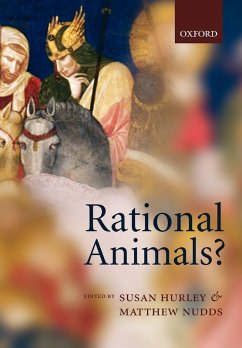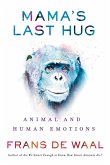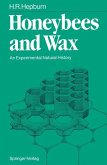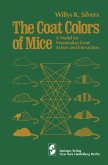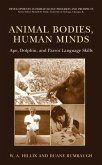- Broschiertes Buch
- Merkliste
- Auf die Merkliste
- Bewerten Bewerten
- Teilen
- Produkt teilen
- Produkterinnerung
- Produkterinnerung
To what extent can animal behaviour be described as rational? What does it even mean to describe behaviour as rational? This book focuses on one of the major debates in science today - how closely does mental processing in animals resemble mental processing in humans. It addresses the question of whether and to what extent non-human animals are rational, that is, whether any animal behaviour can be regarded as the result of a rational thought processes. With adistinguished line-up of leading thinkers from philosophy and psychology, the book presents the first multidisciplinary examination of this topic.…mehr
Andere Kunden interessierten sich auch für
![Harriers of the World Harriers of the World]() Robert Jr. SimmonsHarriers of the World115,99 €
Robert Jr. SimmonsHarriers of the World115,99 €![Mama's Last Hug Mama's Last Hug]() Frans De WaalMama's Last Hug9,99 €
Frans De WaalMama's Last Hug9,99 €![Mama's Last Hug Mama's Last Hug]() Frans De WaalMama's Last Hug18,99 €
Frans De WaalMama's Last Hug18,99 €![Honeybees and Wax Honeybees and Wax]() H. Randall HepburnHoneybees and Wax65,99 €
H. Randall HepburnHoneybees and Wax65,99 €![The Coat Colors of Mice The Coat Colors of Mice]() W. K. SilversThe Coat Colors of Mice97,99 €
W. K. SilversThe Coat Colors of Mice97,99 €![Pests Pests]() Bethany BrookshirePests20,99 €
Bethany BrookshirePests20,99 €![Animal Bodies, Human Minds: Ape, Dolphin, and Parrot Language Skills Animal Bodies, Human Minds: Ape, Dolphin, and Parrot Language Skills]() William A. HillixAnimal Bodies, Human Minds: Ape, Dolphin, and Parrot Language Skills161,99 €
William A. HillixAnimal Bodies, Human Minds: Ape, Dolphin, and Parrot Language Skills161,99 €-
-
-
To what extent can animal behaviour be described as rational? What does it even mean to describe behaviour as rational? This book focuses on one of the major debates in science today - how closely does mental processing in animals resemble mental processing in humans. It addresses the question of whether and to what extent non-human animals are rational, that is, whether any animal behaviour can be regarded as the result of a rational thought processes. With adistinguished line-up of leading thinkers from philosophy and psychology, the book presents the first multidisciplinary examination of this topic.
Hinweis: Dieser Artikel kann nur an eine deutsche Lieferadresse ausgeliefert werden.
Hinweis: Dieser Artikel kann nur an eine deutsche Lieferadresse ausgeliefert werden.
Produktdetails
- Produktdetails
- Verlag: OUP Oxford
- Seitenzahl: 570
- Erscheinungstermin: 6. April 2006
- Englisch
- Abmessung: 244mm x 170mm x 31mm
- Gewicht: 971g
- ISBN-13: 9780198528272
- ISBN-10: 0198528272
- Artikelnr.: 22362826
- Herstellerkennzeichnung
- Libri GmbH
- Europaallee 1
- 36244 Bad Hersfeld
- gpsr@libri.de
- Verlag: OUP Oxford
- Seitenzahl: 570
- Erscheinungstermin: 6. April 2006
- Englisch
- Abmessung: 244mm x 170mm x 31mm
- Gewicht: 971g
- ISBN-13: 9780198528272
- ISBN-10: 0198528272
- Artikelnr.: 22362826
- Herstellerkennzeichnung
- Libri GmbH
- Europaallee 1
- 36244 Bad Hersfeld
- gpsr@libri.de
Edited by Susan Hurley, University of Warwick and All Souls College, Oxford, UK and Matthew Nudds, Department of Philosophy, University of Edinburgh, UK
Contributors: Elsa Addessi, Istituto di Scienze e Tecnologie della Cognizione, Rome, Italy Colin Allen, Dept of History & Philsophy of Science, Indiana University, Bloomington, USA Jose Luis Bermudez, Philosophy, Neuroscience & Psychology Program, Washington University, St Louis, USA Sarah T Boysen, The Ohio State University, Columbia, USA Josep Call, Max Planck Institute for Evolutionary Anthropology, Leipzig, Germany Nicky Clayton, Dept of Experimental Psychology, University of Cambridge, UK Richard Connor, Dept of Biology, University of Massachusetts, Dartmouth, USA Gregory Currie, Dept of Philosophy, University of Nottingham, UK Anthony Dickinson, Dept of Experimental Psychology, University of Cambridge, UK Fred I Dretske, Dept of Philosophy, Duke University, Durham, USA Nathan Emery, Sub-dept of Animal Behaviour, University of Cambridge, UK William M Fields, Dept of Biology & Language Research Center, Georgia State University, Atlanta, USA Louis M Herman, Kewalo Basin Marine Mammal Laboratory, Honolulu, USA Cecilia Heyes, Dept of Psychology, University College London, UK Susan Hurley, Dept of Politics & International Studies, University of Warwick, Coventry, UK Alex Kacelnik,Dept of Zoology, University of Oxford, UK Janet Mann, Dept of Psychology, Georgetown University, Washington DC, USA Ruth Garrett Millikan, University of Connecticut, Storrs, USA Matthew Nudds, Dept of Philosophy, University of Edinburgh, UK David Papineau, Dept of Philosophy, King's College London, UK Irene M Pepperberg, Dept of Psychology, Brandeis University, Waltham, USA Daniel Povinelli, Cognitive Evolution Group, University of Louisiana, Lafayette, USA Joelle Proust, Institut Jean Nicod, Paris, France Duane M Rumbaugh, Great Ape Trust of Iowa, Des Moines, USA E Sue Savage-Rumbaugh, Dept of Biology & Language Research Center, Georgia State University, Atlanta, USA Sara J Shettleworth, Dept of Psychology, University of Toronto, Canada Kim Sterelny, Philosophy Program, Australian National University, Canberra, Australia Jennifer E Sutton, Dept of Psychology, University of Western Ontario, Canada Michael Tomasello, Max Planck Institute for Evolutionary Anthropology, Leipzig, Germany Alain J-P C Tschudin, Corpus Christi College, University of Cambridge, UK Elisabetta Visalberghi, Istituto di Scienze e Tecnologie della Cognizione, Rome, Italy Jennifer Vonk, Cognitive Evolution Group, University of Louisiana, Lafayette, USA
Contributors: Elsa Addessi, Istituto di Scienze e Tecnologie della Cognizione, Rome, Italy Colin Allen, Dept of History & Philsophy of Science, Indiana University, Bloomington, USA Jose Luis Bermudez, Philosophy, Neuroscience & Psychology Program, Washington University, St Louis, USA Sarah T Boysen, The Ohio State University, Columbia, USA Josep Call, Max Planck Institute for Evolutionary Anthropology, Leipzig, Germany Nicky Clayton, Dept of Experimental Psychology, University of Cambridge, UK Richard Connor, Dept of Biology, University of Massachusetts, Dartmouth, USA Gregory Currie, Dept of Philosophy, University of Nottingham, UK Anthony Dickinson, Dept of Experimental Psychology, University of Cambridge, UK Fred I Dretske, Dept of Philosophy, Duke University, Durham, USA Nathan Emery, Sub-dept of Animal Behaviour, University of Cambridge, UK William M Fields, Dept of Biology & Language Research Center, Georgia State University, Atlanta, USA Louis M Herman, Kewalo Basin Marine Mammal Laboratory, Honolulu, USA Cecilia Heyes, Dept of Psychology, University College London, UK Susan Hurley, Dept of Politics & International Studies, University of Warwick, Coventry, UK Alex Kacelnik,Dept of Zoology, University of Oxford, UK Janet Mann, Dept of Psychology, Georgetown University, Washington DC, USA Ruth Garrett Millikan, University of Connecticut, Storrs, USA Matthew Nudds, Dept of Philosophy, University of Edinburgh, UK David Papineau, Dept of Philosophy, King's College London, UK Irene M Pepperberg, Dept of Psychology, Brandeis University, Waltham, USA Daniel Povinelli, Cognitive Evolution Group, University of Louisiana, Lafayette, USA Joelle Proust, Institut Jean Nicod, Paris, France Duane M Rumbaugh, Great Ape Trust of Iowa, Des Moines, USA E Sue Savage-Rumbaugh, Dept of Biology & Language Research Center, Georgia State University, Atlanta, USA Sara J Shettleworth, Dept of Psychology, University of Toronto, Canada Kim Sterelny, Philosophy Program, Australian National University, Canberra, Australia Jennifer E Sutton, Dept of Psychology, University of Western Ontario, Canada Michael Tomasello, Max Planck Institute for Evolutionary Anthropology, Leipzig, Germany Alain J-P C Tschudin, Corpus Christi College, University of Cambridge, UK Elisabetta Visalberghi, Istituto di Scienze e Tecnologie della Cognizione, Rome, Italy Jennifer Vonk, Cognitive Evolution Group, University of Louisiana, Lafayette, USA
* 1: Susan Hurley and Matthew Nudds: The questions of animal
rationality: theory and evidence
* Part I - Types and levels of rationality
* 2: Alex Kacelnik: Meanings of rationality
* 3: Fred I. Dretske: Minimal rationality
* 4: Ruth Garrett Millikan: Styles of rationality
* 5: Jose Luis Bermudez: Animal reasoning and proto-logic
* 6: Susan Hurley: Making sense of animals
* Part II - Rational versus associative processes
* 7: Colin Allen: Transitive inference in animals: reasoning or
conditioned associations?
* 8: David Papineau and Cecilia Heyes: Rational or associative:
Imitation in Japanese quail
* 9: Nicky Clayton, Nathan Emery and Anthony Dickinson: The rationality
of animal memory: complex caching strategies of western scrub jays
* Part III - Metacognition
* 10: Josep Call: Descartes' two errors: reason and reflection in the
great apes
* 11: Sara J. Shettleworth and Jennifer E. Sutton: Do animals know what
they know?
* 12: Joelle Proust: Metacognition and animal rationality
* 13: Gregory Currie: Rationality, decentring, and the evidence for
pretence in nonhuman animals
* Part IV - Social behavior and cognition
* 14: Kim Sterelny: Folk logic and animal rationality
* 15: Elsa Addessi and Elisabetta Visalberghi: Rationality in capuchin
monkey's feeding behavior?
* 16: Richard Connor and Janet Mann: Social cognition in the wild:
Machiavellian dolphins?
* Part V - Mind reading and behaviour reading
* 17: Michael Tomasello and Josep Call: Do chimpanzees know what others
see - or only what they are looking at?
* 18: Daniel Povinelli and Jennifer Vonk: We don't need a microscope to
explore the chimpanzee's mind
* 19: Alain J-P. C. Tschudin: Belief attribution tasks with dolphins:
what social minds can reveal about animal rationality
* Part VI - Behavior and cognition in symbolic environments
* 20: Louis M. Herman: Intelligence and rational behaviour in the
bottle-nosed dolphin
* 21: Irene M. Pepperberg: Intelligence and rationality in parrots
* 22: Sarah T. Boysen: Effects of symbols on chimpanzee cognition
* 23: E. Sue Savage-Rumbaugh, Duane M. Rumbaugh and William M. Fields:
Language as a window on rationality
rationality: theory and evidence
* Part I - Types and levels of rationality
* 2: Alex Kacelnik: Meanings of rationality
* 3: Fred I. Dretske: Minimal rationality
* 4: Ruth Garrett Millikan: Styles of rationality
* 5: Jose Luis Bermudez: Animal reasoning and proto-logic
* 6: Susan Hurley: Making sense of animals
* Part II - Rational versus associative processes
* 7: Colin Allen: Transitive inference in animals: reasoning or
conditioned associations?
* 8: David Papineau and Cecilia Heyes: Rational or associative:
Imitation in Japanese quail
* 9: Nicky Clayton, Nathan Emery and Anthony Dickinson: The rationality
of animal memory: complex caching strategies of western scrub jays
* Part III - Metacognition
* 10: Josep Call: Descartes' two errors: reason and reflection in the
great apes
* 11: Sara J. Shettleworth and Jennifer E. Sutton: Do animals know what
they know?
* 12: Joelle Proust: Metacognition and animal rationality
* 13: Gregory Currie: Rationality, decentring, and the evidence for
pretence in nonhuman animals
* Part IV - Social behavior and cognition
* 14: Kim Sterelny: Folk logic and animal rationality
* 15: Elsa Addessi and Elisabetta Visalberghi: Rationality in capuchin
monkey's feeding behavior?
* 16: Richard Connor and Janet Mann: Social cognition in the wild:
Machiavellian dolphins?
* Part V - Mind reading and behaviour reading
* 17: Michael Tomasello and Josep Call: Do chimpanzees know what others
see - or only what they are looking at?
* 18: Daniel Povinelli and Jennifer Vonk: We don't need a microscope to
explore the chimpanzee's mind
* 19: Alain J-P. C. Tschudin: Belief attribution tasks with dolphins:
what social minds can reveal about animal rationality
* Part VI - Behavior and cognition in symbolic environments
* 20: Louis M. Herman: Intelligence and rational behaviour in the
bottle-nosed dolphin
* 21: Irene M. Pepperberg: Intelligence and rationality in parrots
* 22: Sarah T. Boysen: Effects of symbols on chimpanzee cognition
* 23: E. Sue Savage-Rumbaugh, Duane M. Rumbaugh and William M. Fields:
Language as a window on rationality
* 1: Susan Hurley and Matthew Nudds: The questions of animal
rationality: theory and evidence
* Part I - Types and levels of rationality
* 2: Alex Kacelnik: Meanings of rationality
* 3: Fred I. Dretske: Minimal rationality
* 4: Ruth Garrett Millikan: Styles of rationality
* 5: Jose Luis Bermudez: Animal reasoning and proto-logic
* 6: Susan Hurley: Making sense of animals
* Part II - Rational versus associative processes
* 7: Colin Allen: Transitive inference in animals: reasoning or
conditioned associations?
* 8: David Papineau and Cecilia Heyes: Rational or associative:
Imitation in Japanese quail
* 9: Nicky Clayton, Nathan Emery and Anthony Dickinson: The rationality
of animal memory: complex caching strategies of western scrub jays
* Part III - Metacognition
* 10: Josep Call: Descartes' two errors: reason and reflection in the
great apes
* 11: Sara J. Shettleworth and Jennifer E. Sutton: Do animals know what
they know?
* 12: Joelle Proust: Metacognition and animal rationality
* 13: Gregory Currie: Rationality, decentring, and the evidence for
pretence in nonhuman animals
* Part IV - Social behavior and cognition
* 14: Kim Sterelny: Folk logic and animal rationality
* 15: Elsa Addessi and Elisabetta Visalberghi: Rationality in capuchin
monkey's feeding behavior?
* 16: Richard Connor and Janet Mann: Social cognition in the wild:
Machiavellian dolphins?
* Part V - Mind reading and behaviour reading
* 17: Michael Tomasello and Josep Call: Do chimpanzees know what others
see - or only what they are looking at?
* 18: Daniel Povinelli and Jennifer Vonk: We don't need a microscope to
explore the chimpanzee's mind
* 19: Alain J-P. C. Tschudin: Belief attribution tasks with dolphins:
what social minds can reveal about animal rationality
* Part VI - Behavior and cognition in symbolic environments
* 20: Louis M. Herman: Intelligence and rational behaviour in the
bottle-nosed dolphin
* 21: Irene M. Pepperberg: Intelligence and rationality in parrots
* 22: Sarah T. Boysen: Effects of symbols on chimpanzee cognition
* 23: E. Sue Savage-Rumbaugh, Duane M. Rumbaugh and William M. Fields:
Language as a window on rationality
rationality: theory and evidence
* Part I - Types and levels of rationality
* 2: Alex Kacelnik: Meanings of rationality
* 3: Fred I. Dretske: Minimal rationality
* 4: Ruth Garrett Millikan: Styles of rationality
* 5: Jose Luis Bermudez: Animal reasoning and proto-logic
* 6: Susan Hurley: Making sense of animals
* Part II - Rational versus associative processes
* 7: Colin Allen: Transitive inference in animals: reasoning or
conditioned associations?
* 8: David Papineau and Cecilia Heyes: Rational or associative:
Imitation in Japanese quail
* 9: Nicky Clayton, Nathan Emery and Anthony Dickinson: The rationality
of animal memory: complex caching strategies of western scrub jays
* Part III - Metacognition
* 10: Josep Call: Descartes' two errors: reason and reflection in the
great apes
* 11: Sara J. Shettleworth and Jennifer E. Sutton: Do animals know what
they know?
* 12: Joelle Proust: Metacognition and animal rationality
* 13: Gregory Currie: Rationality, decentring, and the evidence for
pretence in nonhuman animals
* Part IV - Social behavior and cognition
* 14: Kim Sterelny: Folk logic and animal rationality
* 15: Elsa Addessi and Elisabetta Visalberghi: Rationality in capuchin
monkey's feeding behavior?
* 16: Richard Connor and Janet Mann: Social cognition in the wild:
Machiavellian dolphins?
* Part V - Mind reading and behaviour reading
* 17: Michael Tomasello and Josep Call: Do chimpanzees know what others
see - or only what they are looking at?
* 18: Daniel Povinelli and Jennifer Vonk: We don't need a microscope to
explore the chimpanzee's mind
* 19: Alain J-P. C. Tschudin: Belief attribution tasks with dolphins:
what social minds can reveal about animal rationality
* Part VI - Behavior and cognition in symbolic environments
* 20: Louis M. Herman: Intelligence and rational behaviour in the
bottle-nosed dolphin
* 21: Irene M. Pepperberg: Intelligence and rationality in parrots
* 22: Sarah T. Boysen: Effects of symbols on chimpanzee cognition
* 23: E. Sue Savage-Rumbaugh, Duane M. Rumbaugh and William M. Fields:
Language as a window on rationality

